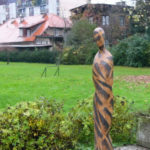Intro: a summary story about a small unusual country in South America that is culturally and historically not part of the continent. It is considered to be a Caribbean country yet is geographically part of the mainland of South America. It is mostly jungle with a thin veneer of development along the Atlantic coast. Unfortunately it has never been able to shake off its history of British occupation from the 18th to 20th centuries, including the language and the pernicious laws that criminalize homosexuality.
It is a culture with strong religious attitudes that influence the government when it considers decriminalizing gay life. It is in several important ways a country stuck in the past—except for the progressive efforts of the remarkable LGBT organizations SASOD and Guybow. I have not yet visited Guyana so the following story is taken from sources listed at the end as well as an online interview with the head of SASOD, Joel Simpson.
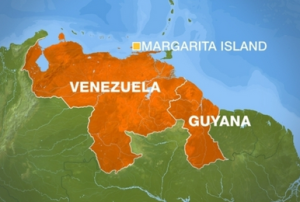
By Richard Ammon, Editor
GlobalGayz.com
February 2016
Guyana, is a small country in northern South America that is mostly ignored by travelers since there are no great beaches, panoramic mountains, ancient ruins, soaring cathedrals, historic places, but it does have exotic jungles cruises. Jungle growth covers 90% of the land mass.
It was home to indigenous native tribes for thousands of years until Europeans sailors explored the continent in the 16th and 17th centuries looking for gold and slaves. First the Dutch arrived then the English soon intruded (1650) into the area with their own plantations of sugar and tobacco. As two sea powers the English and the Dutch battled each other for superiority in this and many other ‘new’ lands—ignoring the native tribes. The 17th century was a time of disarrangement of colonies and territories among England, Holland, France, Spain, and Portugal all acting as if they owned the world. It was a time of ghastly imperialism and land grabbing that ignored and killed off native populations. The most obvious was the ‘possession’ of the ’New World’ by the Spanish, then French then British which led to endless battles with each leading up to the American Revolution in the late 18th century .
Guyana slumbered in relative isolation as a British agricultural colony that required Africa and Asian slaves and, later, indentured laborers from India, to raise sugar, tobacco, coco, cotton, timber and more modern commodities of bauxite, cyanide, and precious metals. But mostly the British ignored Guyana with little infrastructure. Later, in one of history’s great lopsided land swaps Holland traded off New York to the English in exchange for Guyana. (photo right: local Georgetown students)
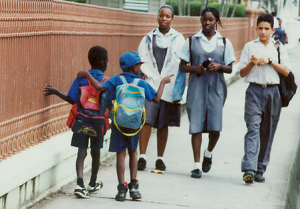
The British attitude toward Guyana was as a place of exile and punishment in addition to the agriculture industry. It has not been a happy history of democracy. The British imposed their language and laws. Along with justifying slavery (abolished in 1838 and after), another pernicious law criminalized same-sax behavior in the colony. Shamefully that law still stands. Today Guyana is the only country in South America that still has such a law. Homosexual acts carry a possible punishment of life imprisonment although the law is rarely enforced but is used more as a ‘moral’ deterrent by religious leaders and as a threat (and blackmail) by police against same-sex behavior.
The colony eventually gained home rule in 1953. In 1966 it became an independent member of the British Commonwealth and in 1970 it became an independent country. Currently it has a population of about 900,000. Inept governance has currently put the country deep in debt with a weak infrastructure; fractious ethnic strife is common.
Another odd Euro legacy is that Guyana is the only South American nation where English is the official language although most citizens speak Guyanese Creole. In addition to being part of the British Commonwealth, Guyana is one of three Caribbean countries that is not an island—along with two other former mainland colonies. Guyana was ruled by England, Surinam by the Dutch and French Guiana by the French— a situation that further separates these small countries in addition to the surrounding dense Amazon jungles. (photo right: national flag)
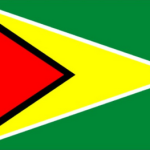
Homosexuality in Guyana
In 2013 CADRES (Caribbean Development Research Services) issued the results a large survey titled: “Attitudes Toward Homosexuals in Guyana”
In their summary report CADRES said: “Guyanese are largely either tolerant or accepting of homosexuals, with the quantity of persons that could genuinely be described as homophobic amounting to approximately 25% of the population. Conversely this means that 58% of Guyanese are either tolerant or accepting of homosexuals while 17% were undecided…
“There are fundamental misunderstandings existing among Guyanese regarding several basis facts about homosexuality and it is entirely possible that these misunderstandings negatively impact on attitudes. Guyanese generally think that homosexuality is largely a male phenomenon and moreover that it is a choice. These are two misunderstandings that carry substantial weight. As well, there is also a heavy religious overtone regarding the proper ‘location’ of sexual orientation and sexual expression, along with the presumption that religious teaching should continue to influence the State’s agenda and treatment of homosexuals. As a result, for LGBT people there is potential and real danger from violence on the street, from slurs, rough treatment, and pervasive overt or covert discrimination.
“In other words, homosexuality is ’sort of’ okay (they should not be discriminated against; not arrested for who they are) but not really too okay and not too visible since it’s not an approved lifestyle.
“The overall context of the debate in Guyana about sexuality pits religious attitudes against human rights and scientific thinking, for example as manifested in opposing arguments about condom distribution in jails. Public Health Minister, Dr George Norton says “I am in full support of accelerating an increased access to HIV prevention, treatment and care services for people in prisons and other closed settings.” Others support him: Guyana Responsible Parenthood Association Programme Director, Renuka Anandjit, 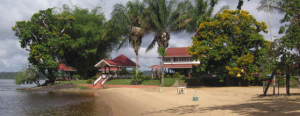 “Yes, do it! At the end of the day you have to look at it from a health perspective – it’s not about promoting homosexuality.” Also supportive is Mike McCormack, Head of the Guyana Human Rights Association (GHRA) who said publicly that the situation is a lot more than just providing condoms in jails but also that of repealing discriminatory laws in Guyana’s constitution. (photo left: beachfront cottages)
“Yes, do it! At the end of the day you have to look at it from a health perspective – it’s not about promoting homosexuality.” Also supportive is Mike McCormack, Head of the Guyana Human Rights Association (GHRA) who said publicly that the situation is a lot more than just providing condoms in jails but also that of repealing discriminatory laws in Guyana’s constitution. (photo left: beachfront cottages)
Progressive advocates are still working uphill (or downhill, if you will) against government resistance as expressed by the Guyanian Public Security Minister, Khemraj Ramjattan who blatantly told a reporter from the local newspaper that he has “not given any thought on the issue (homosexuality as a punishable offense) and declined to further comment.” Coming from this high level authority figure his words ring shallow, ignorant and frightening.
SASOD Gay Rights Organization
Leading the struggle to change the anti-gay sex laws is the Society Against Sexual Orientation Discrimination (SASOD), a grass-roots human rights organization and movement working for equality and justice for all Guyanese. SASOD says it is committed to eradicating discrimination on the grounds of sexuality, gender sexual orientation, gender identity and gender expression in Guyana. It’s also involved in similar work throughout the Caribbean, Latin America, as well as in the Commonwe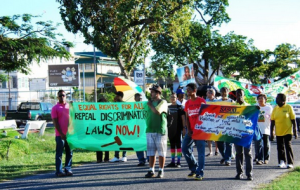 alth.
alth.
SASOD is one of the most active LGBT/Human right organizations in South America; the leaders are Joel Simpson and Ulelli Verbeke. (photo right: SASOD demonstration)
In 2003, SASOD lobbied hard on behalf of the ‘Sexual Orientation’ Amendment Bill. It was introduced in Guyana’s Parliament however in the end the bill was not voted on, as it received significant opposition from sections of the religious community.
Despite this opposition, SASOD has continued undaunted and has advanced resolutions on human rights, sexual orientation and gender identity at the General Assembly of the Organization of American States (OAS) every year since 2008.
Years of indifference and resistance from the government have made SASOD’s progress difficult. In 2012, following a call from Dr. Edward Greene, the United Nations Special Envoy on HIV/AIDS to the Caribbean, to decriminalize homosexuality, the Guyana government announced that year that it was launching a national debate on whether to overhaul the country’s laws that discriminate against LGBT people. Needless to say, virtuous religious groups protested any changes in those laws believing that discrimination is justified according to their version of the Bible.
A year later in 2013, obviously not in any rush, the Government finally created a Parliamentary Commission to decide whether to scrap the country’s buggery laws. It started receiving public submissions in early 2014. However that effort seems to have dissolved like water in sand.
The Struggle Drags On
The latest effort by SASOD, in 2015, was a 12-page report submitted to the UN for the periodic review of Guyana’s human rights. The major points of this submission were:
=The legal structures of Guyana are inherited from the British colonial legal system of the 18th and 19th centuries. Many of the laws have remained the same even after Independence in 1966.
=The Constitution of Guyana has enshrined within it the principles of equality and non-discrimination. The constitution prohibits discrimination on the basis of sex, gender, race, place of origin, political opinions, color or creed. However, it does not expressly prohibit discrimination on the grounds of sexual orientation or gender identity.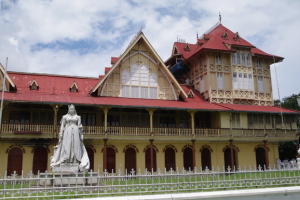
As of January 2016 there has been no significant progress by the government on the matter as most members of Guyana’s parliament stall and resist protective legislation for the LGBT community. Same-sex sexual acts are still illegal and punishable by imprisonment. (photo right: high court with Queen Victoria statue)
Guyana Rainbow Foundation
SASOD works in concert with the Guyana Rainbow Foundation, or GuyBow. The Executive Director/HIV Project Coordinator is Colleen Mc Ewan. GuyBow strives to enhance and sustain the health and well-being of the LBGTIQ communities by providing activities, programs, and services that empower community members. They are committed to working with each other, and local, national, and international groups to strengthen countrywide advocacy and organizing to secure equal opportunities for LGBTIQ Guyanese. Lesbian, gay, bisexual and transgender Guyanese suffer a great deal of stigma and discrimination, with many being forced to keep their sexual orientation and gender identity secret out of fear of being victimized.
Many who have come out publicly have lost their jobs, homes, and been threatened, and harassed, as well as physically attacked such as the June 2013 horrific acid attack on the openly lesbian Ms. Sandy Jackman. “Ms. Jackman made a brave choice to live openly and proudly as a lesbian— a right which every LGBT Guyanese deserves—to freely express themselves. As a victim of a heinous crime, which will require long term medical care and leave permanent mental and physical scars, she deserves nothing less that our utmost sympathy and support,” protested GuyBow representatives A Clarke, P Fraser, S Nageer, S Richardson. 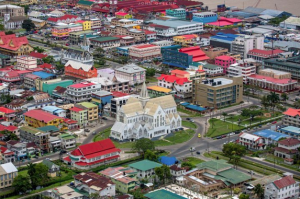
(photo left Georgetown)
Guyana Trans United
Facebook: https://www.facebook.com/pages/Guyana-Trans-United-GTU/148525782006659
GTU was founded in 2012 by Quincy “Gulliver” McEwan and a few friends to help give a grounding point for transgender people looking for community, support and reassurance from isolation. Few people in Guyana understand and tolerate this unusual lifestyle. (Indeed, few gays, lesbians and bi-sexuals claim they understand what transgender means or how it effects one’s life. Most LGBs shy away from trans people because of their ignorance about the complexity of crossing genders; transgender people can be gay, lesbian, straight, bi-sexual, which confuses people outside the trans community.)
That camaraderie is very much needed in the Guyanese society since at least seven transgender Guyanese women have been murdered since 2013, signifying how much that gender variants frighten most straight people (men) enough to harm them. The irrationality of such crimes is in no small part influence by the various anti-gay religions in Guyana: Hinduism, Islam, Christianity and indigenous Amerindian population.
In addition to religious prejudice trans citizens face a legal stigma in that Guyana laws ban cross-dressing. These are used to harass trans people as they seek to earn a living. One of the common effects of such trans-phobia–social rejection and exclusion from the mainstream workforce–is that trans folks are forced to turn to sex work to survive since few have been trained in manual or professional skills. McEwan herself was fired from her job in bakery because of phobic attitudes.
The she got mad and decided to fight back. With help fro SASOD, the largest LGBT organization in the country, GTU filed a suit against the law that banned cross dressing (a long ago outdated remnant of British law). The outcome, as of January 2016, is still pending.
SASOD on the Move
In November 2015 SASOD hosted a conference in observance of the “16 Days of Activism against Gender-Based Violence (GBV)”; the conference kicked off on November 25 – International Day for the Elimination of Violence Against Women – and ran until December 10 – Human Rights Day. SASOD held daily activities, both on its social media sites and in-person events.
Marking World AIDS Day 2015, SASOD made a robust submission to the National Dialogue on HIV and the Law, that begin on December 9 and culminated on December 10, Human Rights Day. SASOD is pressed for repeal of archaic anti-gay laws – a position which the organization has bee
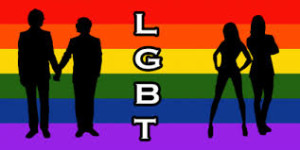 n advocating at local, national and international levels for over 12 years. These and other issues related to human rights and key populations affected by HIV formed part of the two-day national conference headed by members of government ministries and civil society organizations-with technical and financial support from the United Nations Development Program (UNDP).
n advocating at local, national and international levels for over 12 years. These and other issues related to human rights and key populations affected by HIV formed part of the two-day national conference headed by members of government ministries and civil society organizations-with technical and financial support from the United Nations Development Program (UNDP).
http://sasod.blogspot.com/
These actions are only a few of the numerous efforts SASOD continues to vigorously advocate. Virtually monthly there are meetings. conferences, seminars, testimonies, training programs, workshops that advance human and equal rights both domestic and international—such as the Guyana Equality Forum and the Caribbean Women and Sexual Diversity Conference.
Two Personal Stories
Joel Simpson, co-director of SASOD, was interviewed live on “Morning Times” on TVG Channel 28 in March 2015 about his experiences growing up in Guyana as a gay person. (see video interview): “I felt I was different from my peers but I 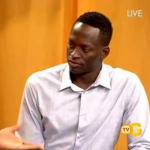 wasn’t sure what that was until my early teens when my friends talked about girls and I was not interested. I did learn early on that this was not something I could talk about. Young people get homophobic early and make fun of homosexual others that’s not friendly or nice to hear. Gay people learn to be afraid before they understand themselves.” (photo left: Joel Simpson)
wasn’t sure what that was until my early teens when my friends talked about girls and I was not interested. I did learn early on that this was not something I could talk about. Young people get homophobic early and make fun of homosexual others that’s not friendly or nice to hear. Gay people learn to be afraid before they understand themselves.” (photo left: Joel Simpson)
A second testimony about growing up and living gay in Guyana comes from Guybow member M. Kobe (an alias) whose story was published in CaribWorldNews, December 1, 2010 written by Elan Era John. See this personal story about growing up and living gay in Guyana. In the story, Kobe said: “`You find that bus conductors and drivers may not stop to pick you up, or upon discovering the person`s orientation may not want that person in the bus. I go to shop and I get sold, I get [attended to]. But even the taxi drivers, you have a big issue where they might not want to pick you up. They may slow down when flagged down but when they see who you are they drive away…”
References for this story:
SASOD: http://www.sasod.org.gy/
CADRES: http://www.inewsguyana.com/%E2%80%8Banti-buggery-laws-homosexuality-hivaids-behind-bars/
Gay rights: http://www.huffingtonpost.com/news/guyana-gay-rights/
Trans People Fight for Visibility and Respect: http://www.takepart.com/article/2015/06/23/guyanas-transgender-community
Video ‘Growing Up Gay in Guyana’: https://www.youtube.com/watch?v=S9ylsuohJZI
History and current status: Wikipedia
Country profile: http://news.bbc.co.uk/2/hi/americas/country_profiles/1211428.stm
Protest against biased reporting: http://www.stabroeknews.com/2013/opinion/letters/06/29/irresponsible-reporting-perpetuates-a-climate-of-intolerance-against-lgbt-community/
Stella’s Sisterhood of Support & Service
https://www.outrightinternational.org/content/letter-president-republic-guyana
CARICOM: http://www.caricom.org/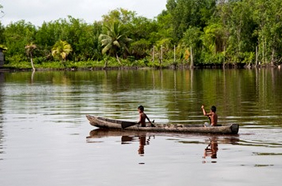
The Caribbean Community has its headquarters in Guyana’s capital Georgetown. The Community and exists to promote cooperation among Caribbean countries in advancing social, cultural and technological development among all 15 members and 5 associate members. In 2008, Guyana joined the Union of South American Nations as a founding member. This consortium is modeled after the European Union with intentions for a common currency, multi-nation parliament, a common passport as well as beneficial trade arrangements. It’s expected the union will coalesce in 2019. Such a union was the dream of South America’s great liberator Simon Bolivar in the 19th century but he envisioned a coalition of all South American colonies and countries, which of course has never happened.

